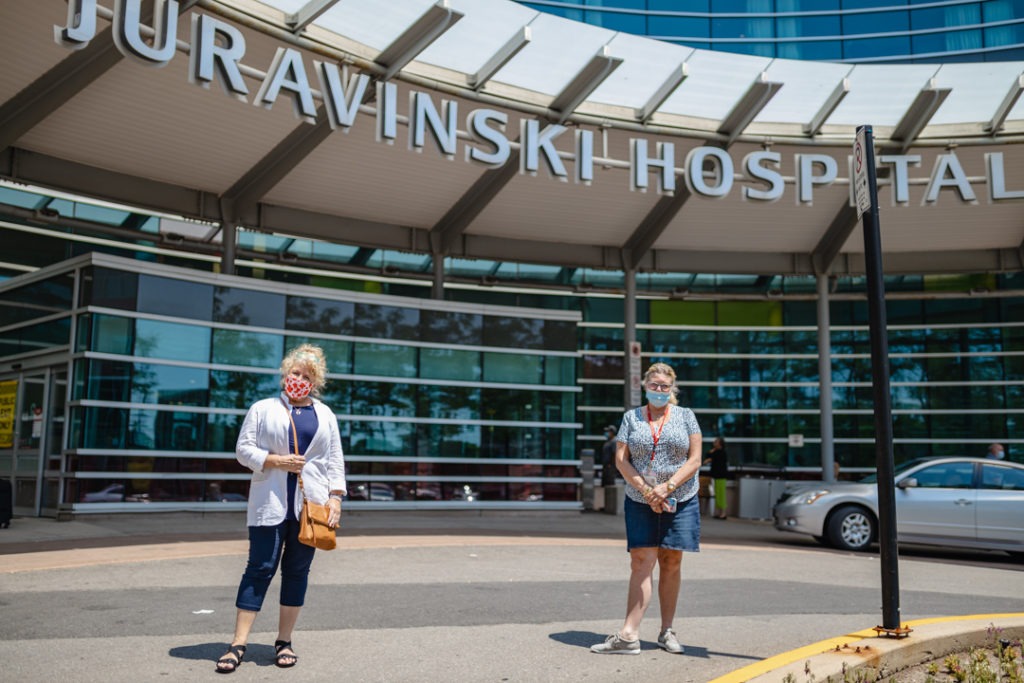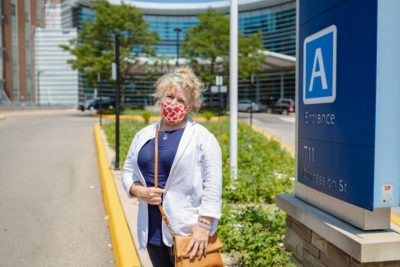
Patients fare better with return of family and caregivers
Normally when Jeanette Arsenault visits her brother Ronald Arsenault in the intensive care unit, she sits with him for eight to twelve hours a day, every day. Ronald, 61, has cerebral palsy and is non-verbal, so Jeanette relies on reading his micro-expressions such as eyebrow movements.
When COVID-19 hit and hospitals had to limit visitors, it was a real challenge for both of them.
“That was very, very difficult,” said Jeanette. “The added stress of the whole situation was that you couldn’t be mad at the hospital or the staff. I understood that in these extraordinary circumstances, it’s no one’s fault. It’s the situation that is hard on everybody.”
New visitor guidelines
Now, though, visitor guidelines have changed and she’s able to visit every other day for a couple of hours. All visitors are asked to wear masks, clean their hands, and stay a shorter time than usual.
Jeanette talks to Ronald, rubs his shoulders, plays music for him, and watches his face light up when she connects with their parents on FaceTime. In their mid-80s and living in Prince Edward Island, they’re not able to travel and visit their adult children due to the virus restrictions.
“Ron can communicate,” Jeanette says, “but you need to know the signals.”
Jeanette says HHS social workers at the Juravinski Hospital provided a vital link to her brother when she couldn’t come to see him in person.
Victoria Gibbins used an iPad to make sure Jeanette could see Ronald, and that he could hear her.
“He just beams when he hears her voice,” says Gibbins. “She’s a really good advocate for him.”
Sense of relief
 “The staff would ask for my input. I appreciated that,” says Jeanette. “That is specifically something about the Juravinski that’s been terrific. I felt like I was part of the team taking care of Ronald. And that what I had to share with them about his particularities was valued and they encouraged me to call.”
“The staff would ask for my input. I appreciated that,” says Jeanette. “That is specifically something about the Juravinski that’s been terrific. I felt like I was part of the team taking care of Ronald. And that what I had to share with them about his particularities was valued and they encouraged me to call.”
Gibbins says both patients and staff are glad to have visitors back in the hospitals. She says she sees a real difference in mental health in both groups now.
“Families have a huge sense of relief when they’re at the bedside,” she says. “They can see for themselves what’s going on with their loved one.”
‘Smilingest’ man on the planet
As Ronald recovers from a major infection and respiratory issues in the ICU, his sister is enjoying how the staff are getting to know his personality and his communication cues.
“Ronald has one problem – he smiles too much,” says Jeanette, jokingly. “This man is the most smilingest man on the planet. He will smile in the middle of his pain. I think it’s his survival instinct. The more he smiles, the more people come around to see him. Eventually, hopefully, people will look and see what’s wrong.”
A professional singer-songwriter, Jeanette has even penned a Spiderman parody song about Ron’s grins.
Jeanette’s home is in Bellville but recently she’s been living in a hotel in Hamilton to be close to Ron. Even though this time has been particularly difficult, she puts gratitude first when describing her relationship with the hospital.
“I so appreciate all the measures that are in place to keep our family and loved ones safe. And to help families say in touch with their loved ones,” she says.
